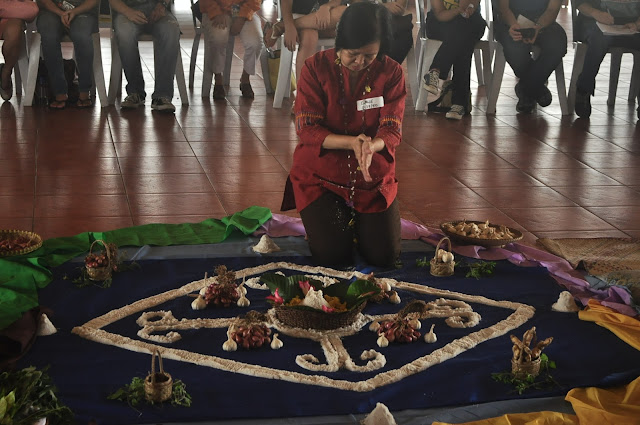Tinig ng Babaylan featuring Grace Nono
and
Baylan Undin (Babaylan Elder from Mindanao)
January 19, 2013 / 9:00AM to 4:00 PM
3rd Floor, Bulwagang Tandang Sora
College of Social Work & Community Development (CSWCD)
University of the Philippines,
Diliman, Quezon City
Babaylan is a Visayan term which refers to an archetypal
Filipino community leader (other Filipino archetypes include the datu and
panday) who functions as the community’s religious leader and ritual expert,
healer, culture-bearer as well as one having extensive theoretical and
practical knowledge of nature and people. Historically, while the babaylan is
often a woman, the role and functions of the babaylan are open to both males
and females.
"I
will share about the babaylan and other Philippine popular religion
functionaries whom I have mingled with in the Philippines these past few years. I
will particularly focus on their use of voice…”
~ Grace Nono
Baylan
Undin (a Babaylan Elder from Mindanao) will do
the Panawagtawag in which she will ask permission from
her spirit helpers to participate in the Buhay Babaylan event.
Resource Persons:
GRACE NONO is a Philippine music artist who
has been specializing both in the performance of Philippine oral chants in the Philippines
and around the world these past fifteen years, and in the documentation of oral
traditions for educational purposes. A graduate of the University of the
Philippines-Diliman where she received her bachelors in Humanities and masters
in Philippine Studies, as well as a PhD candidate in Ethnomusicology at New
York University, she is author of The Shared Voice: Chanted and Spoken
Narratives from the Philippines (ANVIL and Fundacion Santiago, 2008), and Song
of the Babaylan: Living Voices, Medicines, Spiritualities of Philippine
Ritualist-Oralist-Healers (Institute of Spirituality in Asia, “in press”).
Grace is also the founding head to the Tao Foundation for Culture and Arts, a
Philippine non-government organization engaged in cultural regeneration
projects in Agusan, her birthplace, and in other parts of the Philippines. To date, Grace has
been granted over forty awards including The Outstanding Women in the Nation’s
Service (TOWNS), Ten Outstanding Young Men (TOYM), Distinguished Alumni Award
from the University of the Philippines, National Book Award (for The Shared
Voice), numerous Katha, Awit and Catholic Mass Media awards, for her music and
cultural contributions.
LORDINA “UNDIN” POTENCIANO (Babaylan Elder) is a Manobo
baylan based in La Paz,
Agusan del Sur. She came to baylanhood after she was called and consecrated by
spirits, led by her late grandmother. She had since been tasked to officiate
during rituals where spirits chant and dance through her, and to heal the sick
and help those in need, on a full-time basis. Undin is one of Grace Nono's
chant teachers. She is also in Grace's book Song of the Babaylan.
ROBILYN COGUIT CANTO (Babaylan’s interpreter), Undin's
niece, is a Manobo youth leader originally from La Paz, Agusan del Sur. She has participated
in national youth festivals where she asserted the indigenous voice. She is
also a master of traditional embroidery and beadwork, and has led her people
through arts and crafts revitalization projects. Robilyn has been a member of
the Tao Foundation for Culture and Arts that Grace Nono founded for many years
now.
GENERAL ADMISSION: P500
BUY
YOUR TICKETS NOW. LIMITED SEATS. TICKETS available at :
*Handog
Gift Shop, U.P. Diliman Shopping Center, U.P. Diliman, Quezon City
*Popular
Bookstore, 305 Tomas Morato Street,
Quezon City
*Kanto,
7274 Malugay Street, Makati City
*Bahay
Nakpil-Bautista, 432 A. Bautista
Street, Quiapo
For
Inquiry:
0915
2952826 (Ishilta), 0933 9257861 (Tessie), 0927 5633376 (Raymond), 0928 5545824
(Minifred) www.facebook.com/buhaybabaylan / www.buhaybabaylan.blogspot.com
Email: buhaybabaylan@gmail.com




